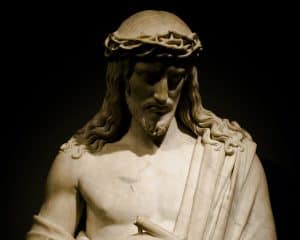By Miriam
Miriam is a PhD candidate in Prevention Science at the University of Oregon, mother of 3 girls, and striving to teach her girls that their voices matter.
My family does 3-5-minute scripture study sessions while we eat dinner at night. I’ve found that it’s helpful if I make quick little segmented lessons ahead of time that we just pull out during dinner. Because I have an 8 year old who is sick of hearing solely men’s voices in the scriptures and over pulpit, I try to include as many women’s voices as I can. We also rarely have dinner together a full 7 nights in the week, so I usually don’t make a full 7 lesson plans. I’m sharing these lesson plans here with you.
These chapters in Genesis have some craziness to them with incest and rape and all kinds of Old Testament-esque type things. I’ll give a quick recap of each chapter below (which some of them I probably won’t be sharing with my inquisitive little 8 year old), then delve into something I think we can learn from it.
Genesis 18 – Abraham and Sarah are told by some holy men that they’ll have a baby even though they’re super old. They’re also told the Sodom and Gomorrah will be destroyed.
- In this chapter, Sarah and Abraham don’t think it could be possible for them to have a baby because they’re super old, but God says to Abraham, “Is any thing too hard for the Lord?” (Genesis 18:14). Then later in the chapter Abraham’s friends are going over to Sodom, but it says Abraham didn’t and instead “Abraham stood yet before the Lord.” (Genesis 18:22)
- I think we can see miracles when we’re willing to accept the Lord. Sister Elaine S. Dalton said in General Conference, “be not moved in your acceptance of the Savior’s Atonement.”
- How can we stand firm in accepting the Savior? What miracles have you seen in your life as you’ve tried to accept the Savior?
- I think we can see miracles when we’re willing to accept the Lord. Sister Elaine S. Dalton said in General Conference, “be not moved in your acceptance of the Savior’s Atonement.”
 Genesis 19 – Lot is told to take his family and flee their community. He takes his wife and two daughters but leaves the son-in-laws. While they’re fleeing, Lot’s wife turns back and gets turned into salt. When Lot and his daughters get to the mountains, the daughters get their dad drunk and rape him so that his seed will be preserved.
Genesis 19 – Lot is told to take his family and flee their community. He takes his wife and two daughters but leaves the son-in-laws. While they’re fleeing, Lot’s wife turns back and gets turned into salt. When Lot and his daughters get to the mountains, the daughters get their dad drunk and rape him so that his seed will be preserved.
- In verse 26 is the famous story where Lot’s “wife looked back from behind him, and she became a pillar of salt.”
- Having doubts is normal and Lot’s wife was clearly having some doubts. The Bible doesn’t give us enough context as to why her doubts meant she wasn’t allowed to live and I’m sure there was a lot more to it than the 13 words we read in Genesis. Setting what was going on for Lot’s wife aside, let’s think about what it means for us to doubt. Reverend Jacqui Lewis said on her blog, “Come and bring your heart — broken, but healing; your dreams — deferred but vivid; and your faith — which likely sits alongside some doubt. Be comforted, loves, that doubt actually makes our faith stronger. The wrestling, the struggling, the doubting grows our faith muscle. Don’t be afraid to express the doubt, to dig into it, to be, as my therapist would say, on its side. The truth of that all will set you free for move love! These are hot-mess times, the kinds of times that can inspire doubt. I have doubts, but I am absolutely confident that good people all over the globe are putting love in the world, love that is stronger than hate.”
- How can we use our doubts to grow our faith muscles and help us become closer to God?”
- Having doubts is normal and Lot’s wife was clearly having some doubts. The Bible doesn’t give us enough context as to why her doubts meant she wasn’t allowed to live and I’m sure there was a lot more to it than the 13 words we read in Genesis. Setting what was going on for Lot’s wife aside, let’s think about what it means for us to doubt. Reverend Jacqui Lewis said on her blog, “Come and bring your heart — broken, but healing; your dreams — deferred but vivid; and your faith — which likely sits alongside some doubt. Be comforted, loves, that doubt actually makes our faith stronger. The wrestling, the struggling, the doubting grows our faith muscle. Don’t be afraid to express the doubt, to dig into it, to be, as my therapist would say, on its side. The truth of that all will set you free for move love! These are hot-mess times, the kinds of times that can inspire doubt. I have doubts, but I am absolutely confident that good people all over the globe are putting love in the world, love that is stronger than hate.”
Genesis 20 – Abraham and Sarah go to a new town and decide to tell people they’re brother and sister instead of husband and wife (which, news flash: I didn’t realize…they actually are half siblings who married each other). Apparently Abraham thought people might kill him “for his wife’s sake.” Abimelech sleeps with Sarah then is told in a dream that she’s married so he gets kinda upset that he didn’t know. But Abimelech and Abraham made up and seemed to be chummy by the end of the chapter. Also, it says Abimelech has a wife, so there’s clearly a gendered double standard for who is allowed to sleep with multiple women.
- In verse 17, it says that “Abraham prayed unto God: and God healed Abimelech, and his wife, and his maidservants; and they bare children.”
- God heals. Christian blogger Christina from belovedwomen.org said, “I want to remind you today that we serve a God who is a healer and is in the business of restoring that which is broken and making it into something beautiful.”
- How has God healed you? How have you allowed God to help restore broken parts of you? How is God healing you know?
- God heals. Christian blogger Christina from belovedwomen.org said, “I want to remind you today that we serve a God who is a healer and is in the business of restoring that which is broken and making it into something beautiful.”
Genesis 21 – Sarah has that baby she was promised. So then Sarah tells Abraham to get rid of Hagar and her child and they are forced to leave. God hears the prayers of Hagar and her son and God is with them. Abraham and Abimelech promise each other to be friends (I think that’s what the covenant was)
- Hagar thinks she’s about to die because she’s left destitute. She puts her baby under a shrub because she doesn’t want to have to watch him die. But God heard the baby crying and sent an agnel who said to her “What aileth thee, Hagar? fear not; for God hath heard the voice of the lad where he is. Arise, lift up the lad, and hold him in thine hand; for I will make him a great nation.” (verses 17-18)
- Hopefully we won’t have to experience the immense heartache Hagar was going through as she was rejected from her home and had nowhere to turn. However, we each will experience heartache and fear. It is in those moments where it seems that no one is there for us that we need to remember that God really is there for us. Sister Sharon Eubank said for a BYU-Pathways devotional, “The Lord loves you. He is aware of you. He will bless you in the smallest things if you ask Him for help. As many times as you get up and try again, He will be there for you. He won’t ever give up on you.”
- How can this knowledge, that God won’t ever give up on you, help you? How can we remember this and feel it in our souls?
- Hopefully we won’t have to experience the immense heartache Hagar was going through as she was rejected from her home and had nowhere to turn. However, we each will experience heartache and fear. It is in those moments where it seems that no one is there for us that we need to remember that God really is there for us. Sister Sharon Eubank said for a BYU-Pathways devotional, “The Lord loves you. He is aware of you. He will bless you in the smallest things if you ask Him for help. As many times as you get up and try again, He will be there for you. He won’t ever give up on you.”
Genesis 22 – God tells Abraham to kill Isaac like an animal sacrifice. He starts to do it but then is stopped by an angel and given an animal to kill instead.
- Abraham is promised by God, “And in thy seed shall all the nations of the earth be blessed; because thou hast obeyed my voice.” (verse 18)
- Sister Barbara W. Winder said in a General Conference address, “as we obey the commandments, we have the evidence of blessings, feelings of accomplishment, and inner peace… Through obedience we build spiritual strength that sustains us during times of adversity.”
- How has obedience brought you strength? How has obedience brought you closer to God?
- Sister Barbara W. Winder said in a General Conference address, “as we obey the commandments, we have the evidence of blessings, feelings of accomplishment, and inner peace… Through obedience we build spiritual strength that sustains us during times of adversity.”
Genesis 23 – In verse 1 Sarah dies and the rest of the chapter seems to be about Abraham negotiating a burial fee.
- Perhaps this might bring a discussion about death and what that might mean in your own family. Death is hard and it can mean a lot of different things for different people.
- Anglican Pastor Tish Harrison Warren shared her thoughts on death in a NYTimes piece. She said,
“I believe that after I die, somehow mysteriously but also materially, Jesus will raise me up to live on this good earth, made new. I believe this because I believe that Jesus is risen from the dead. Specifically, I believe the witness of the disciples and others who lived and died for their claim that they (and somewhere around 500 others) had seen Jesus alive again and spoken to and touched him. That’s ultimately why I believe there’s a God at all and why I believe God has defeated death.
“As a priest, when I talk about life after death with others, I tend to keep it objective, theological and creedal. I worry about making resurrected life sound sentimental, as though we are just making stuff up, dreaming of what we wish was true. So I try to be evenhanded and factual.
“But the fact is, I believe this is true, and I believe there are good reasons to believe it’s true, but I also want it to be true.
“I hate death. I have never made my peace with it and I never will. I don’t want to live in a world where everything good suddenly ends…I want to see the people I love again.
I hope that my longing for eternity — for joy and pleasure and friendship and beauty to last — is there because it whispers of something that is true. I hope that death feels wrong to me because it really is wrong, it really is not how things are meant to be. And I hope that this hope for more is not silly or delusional. I hope to see my friends again and that death is an interruption, but not an ending.”
What do you believe about death? How does your relationship with the Savior impact your feelings of death?






3 Responses
Thank you for these insights. I love a good religious discussion over dinner!